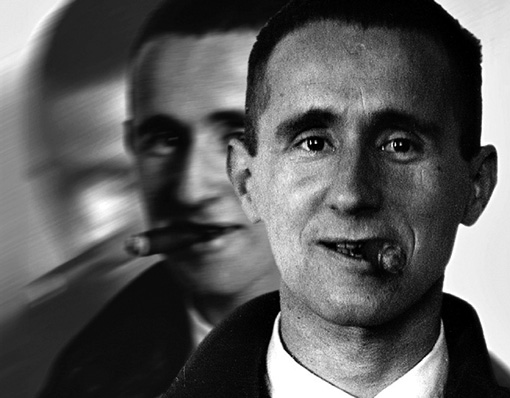Bertolt Brecht (1898-1956)! When I was living in Berlin I intuitively liked the other of the Dreigroschenoper and Mutter Courage, even though I never sat through a live performance of his great plays for lack of money. He would understand. In his poetry, Brecht was a master of political verse, if I may lecture you on the obvious. I am reading a small poem about the burning of books, that horrendous, tasteless and cowardly feat of the nazis in 1933. I read a translation by Michael R. Burch:
The burning of the books
When the Regime
commanded the unlawful books to be burned,
teams of dull oxen hauled huge cartloads to the bonfires.Then a banished writer, one of the best,
scanning the list of excommunicated texts,
became enraged: he’d been excluded!He rushed to his desk, full of contemptuous wrath,
to write fierce letters to the morons in power —
Burn me! he wrote with his blazing pen —
Haven’t I always reported the truth?
Now here you are, treating me like a liar!
Burn me!
It feels a bit strange to read a poem in a language I have written poetry in myself. The first thing that struck me in comrade Bertolt’s description of the burning scene is that he sees the animals, the oxen pulling the cartloads. Love for the most refined and unworldly our minds produce coincides with love for the ‘dull’ animals (the word fails in German; the original mentions that the oxen are forced).
In the second stanza the translation makes the mistake of introducing a facile rhyme (best – texts) where in the original there are lines of prose, awkwardly cut off (a trademark of Brecht):
Ein verjagter Dichter, einer der besten, die Liste der
Verbrannten studierend, entsetzt, daß seine
Bücher vergessen waren. Er eilte zum Schreibtisch…
The ‘morons in power’ must have been fun for our translator, but the German just says Machthaber. Burn me, for I wrote the truth! Don’t treat me like a liar! We understand the joke Brecht tells us here and would smile if it weren’t so serious. This is what speaking ‘truth to power’ looks like in its ultimate consequence. When the un-truth of power is all-pervasive a Truth must command its self-destruction to remain truthful to itself. In that sense this poem is remarkably prescient of the horrors that were the result of 1933.
Observe that Brecht writes “burn me” (verbrennt mich) rather than “burn my books”. The famed bonmot by Heine, ‘Where they burn books, they will too in the end burn people’ has been fully internalized here.


One thought on “Reading: Burning of books by Bertolt Brecht”
Comments are closed.